Charles Ferrer
 Researchers at CU Boulder have developed a new bioimaging device that can operate with significantly lower power and in an entirely non-mechanical way. It could one day improve detecting eye and even heart conditions.
Researchers at CU Boulder have developed a new bioimaging device that can operate with significantly lower power and in an entirely non-mechanical way. It could one day improve detecting eye and even heart conditions.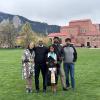 CU Boulder alumnus Ram Narayanswamy is revolutionizing imaging technology through innovations in meta-optics and ultra-compact camera systems. His 30-year career spans NASA, Intel and now NIL Technology, where he's helping shape the future of how imaging and people see the world.
CU Boulder alumnus Ram Narayanswamy is revolutionizing imaging technology through innovations in meta-optics and ultra-compact camera systems. His 30-year career spans NASA, Intel and now NIL Technology, where he's helping shape the future of how imaging and people see the world.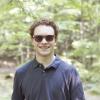 Samuel Silberman, an incoming PhD student in electrical engineering, has been named a 2025 Draper Scholar by Draper. The prestigious graduate fellowship will support his research into radio frequency lens design using advanced 3D printing and additive manufacturing.
Samuel Silberman, an incoming PhD student in electrical engineering, has been named a 2025 Draper Scholar by Draper. The prestigious graduate fellowship will support his research into radio frequency lens design using advanced 3D printing and additive manufacturing. Andras Gyenis, assistant professor of electrical engineering, has earned a CAREER award through the National Science Foundation to design and build more robust superconducting qubits that could push the boundaries of quantum hardware.
Andras Gyenis, assistant professor of electrical engineering, has earned a CAREER award through the National Science Foundation to design and build more robust superconducting qubits that could push the boundaries of quantum hardware.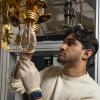 Arjun Dalwadi, a third-year electrical and computer engineering student, is immersing himself in all things quantum through the Quantum Scholars program and as an undergraduate researcher in the Gyenis Lab. Dalwadi is on the journey to make an impact for quantum computing.
Arjun Dalwadi, a third-year electrical and computer engineering student, is immersing himself in all things quantum through the Quantum Scholars program and as an undergraduate researcher in the Gyenis Lab. Dalwadi is on the journey to make an impact for quantum computing.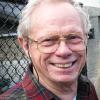 Russell Hayes, professor emeritus, remembered for microwave and optical research and mentorship with the Department of Electrical, Computer and Energy Engineering at CU Boulder.
Russell Hayes, professor emeritus, remembered for microwave and optical research and mentorship with the Department of Electrical, Computer and Energy Engineering at CU Boulder.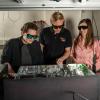 A team of CU Boulder researchers has introduced a quantum sensing technique that could lead to improvements in how we monitor infrastructure, detect changes in the environment and conduct geophysical studies.
A team of CU Boulder researchers has introduced a quantum sensing technique that could lead to improvements in how we monitor infrastructure, detect changes in the environment and conduct geophysical studies.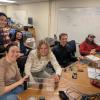 Graduating seniors from ECEE will present 17 capstone projects at the 2025 Engineering Project Expo on April 25. These innovations span sustainability, robotics, environmental sensing and biomedical tech showcasing student creativity and real-world impact. Join us!
Graduating seniors from ECEE will present 17 capstone projects at the 2025 Engineering Project Expo on April 25. These innovations span sustainability, robotics, environmental sensing and biomedical tech showcasing student creativity and real-world impact. Join us!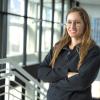 Tamara Lehman, assistant professor of computer engineering, has earned a CAREER award through the National Science Foundation to address hardware vulnerabilities in microarchitecture designs while exploring security metrics for future hardware designs.
Tamara Lehman, assistant professor of computer engineering, has earned a CAREER award through the National Science Foundation to address hardware vulnerabilities in microarchitecture designs while exploring security metrics for future hardware designs.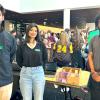 The ECEE Department volunteered at the 2025 Denver Metro Science Fair and engaged with middle and high school students with hands-on activities such as building paper circuits and changing LED colors. The event sparked curiosity and excitement, inspiring the next generation of engineers.
The ECEE Department volunteered at the 2025 Denver Metro Science Fair and engaged with middle and high school students with hands-on activities such as building paper circuits and changing LED colors. The event sparked curiosity and excitement, inspiring the next generation of engineers.

